Using Data to Tell Your Story with Impact: July’s Executive Director Roundtable Wrap-Up
By Hannah Atlas
Kevin Klingbeil knows data. As managing director of Big Water Consulting, a Global Washington member, he works with a range of clients, from small non-profits to government agencies to tribal groups, to assist them with incorporating meaningful data and visual data mapping into their daily operations.
“Big Water Consulting seeks to provide long-term, capacity-building solutions, rather than one-off projects and quick fixes to systematic problems,” said Klingbeil. “We make concerted efforts to respect and embrace each of our clients’ organizational and cultural values to ensure the most advantageous and sustainable outcome.”
Klingbeil presented about data collection, utilization and presentation at Global Washington’s July Executive Director Roundtable. He started the conversation by asking, “How do you measure impact and define success in your organization?” Klingbeil asked this question so that he could get to the “how,” because he knows that it’s the “how” where many organizations fall short. He cautioned that relying on words or vague phrases like “dramatic improvement” or “meaningful” and “significant” as a means of conveying the reach of an organization could do more harm than good. That is why Klingbeil and his firm advocate for the use of data in an organization’s narrative to create an image that is honest and transparent.
Continue Reading
July 2014 Newsletter
Welcome to the July 2014 issue of the Global Washington newsletter. If you would like to contact us directly, please email us.
IN THIS ISSUE
Note from our Executive Director
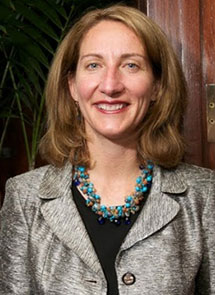 Phuket in February and Seattle in August. Many Washingtonians working in global development plan their international travel for the fall and winter so that they can be home to enjoy our state’s glorious summer. And, why not? For many, July is a month where work slows down, happy hours become more frequent, and there are weekly opportunities to get out and meet with peers. All of this means that summer is a busy time for Global Washington.
Phuket in February and Seattle in August. Many Washingtonians working in global development plan their international travel for the fall and winter so that they can be home to enjoy our state’s glorious summer. And, why not? For many, July is a month where work slows down, happy hours become more frequent, and there are weekly opportunities to get out and meet with peers. All of this means that summer is a busy time for Global Washington.
We have several upcoming events to showcase our members to new audiences. Global Washington is working with Russell Investments to present speakers who will raise awareness among local Russell employees on topics such as impact investing, microcredit, and sustainable development. We are also working with several elected officials, including Congressman Adam Smith and Congressman Jim McDermott, to provide our members with opportunities to engage directly with these officials and their staffs to talk about the issues that you care about.
Lastly, please make sure to mark your calendar for the 6th Annual Global Washington Conference on December 3, 2014. Participants will include NGO practitioners, CSR business executives, research experts, philanthropists, and others working on global issues. Conference sessions will highlight successful partnerships, groundbreaking innovations, and productive failures within global development. We plan on having our most successful conference yet, and I hope all of you plan to be there.
Enjoy the beautiful weather over the next month and I hope you can take advantage of summer gatherings to catch up with old friends and make new connections. I look forward to seeing all of you very soon.

Kristen Dailey
Executive Director
Back to Top

Back to Top

GlobalWA will ask you a question every month and synthesize the responses and make available to our member organizations. Please take a moment to respond to the question for this month:
The 6th Annual GlobalWA Conference is on December 3, 2014. What are you most looking forward to at this year’s conference and/or who would you like to hear speak?
Please click here to respond.
Back to Top
Global Development in the News
The Millennium Development Goals: What Happens After 2015?
By Sam Wolff
At the turn of the century, the United Nations created the eight Millennium Development Goals (MDGs), which range from vastly reducing extreme poverty to halting the spread of HIV/AIDS to providing universal primary education. The target date to achieve the goals is 2015. The drafting process has begun for post-2015 goals, also known as the Sustainable Development Goals (SDGs), which will likely play a large role in shaping the future of the world’s developing economies and the international economy.
Here is a primer on the original MDGs that were determined in 2000. They are:
- Eradicate extreme poverty and hunger
- Achieve universal primary education
- Promote gender equality and empower women
- Reduce child mortality
- Improve maternal health
- Combat HIV/AIDS, malaria, and other diseases
- Ensure environmental sustainability
- Develop a global partnership for development.
These goals were founded upon a premise formulated and agreed upon by world leaders that “in addition to our separate responsibilities to our individual societies, we have a collective responsibility to uphold the principle of human dignity, equality and equity at the global level.” This statement could be a mantra of any global citizen, however, the latter half of the declaration states that, “As leaders, we have a duty therefore to all of the world’s people, especially the most vulnerable and, in particular, the children of the world, to whom the future belongs1.”
The MDG declaration was not only a step towards a more cohesive international community but a marker of a changing culture – a global culture which is aware of and, through the guidance of its leadership, actively pursues a more widely encompassing notion of human identity.
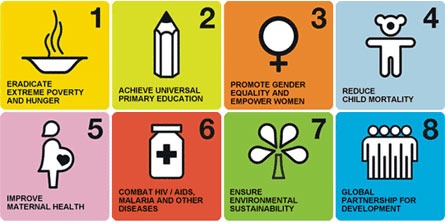 Certainly, the MDG declaration, as with nearly all legislation, was not perfect. Critiques by scholars and the popular media criticized the lack of analysis behind the MDGs’ tenets. One example cited of this under-analysis is the problematic and exasperating nature of World Bank loans to developing economies. Another is the under-emphasis on agricultural development within the MDGs, despite the fact that vast numbers of the impoverished world subsist through agriculture.
Certainly, the MDG declaration, as with nearly all legislation, was not perfect. Critiques by scholars and the popular media criticized the lack of analysis behind the MDGs’ tenets. One example cited of this under-analysis is the problematic and exasperating nature of World Bank loans to developing economies. Another is the under-emphasis on agricultural development within the MDGs, despite the fact that vast numbers of the impoverished world subsist through agriculture.
A possible cause of these perceived flaws alludes to a larger, more problematic theme in MDG-related UN decision making. This was noted by the International Planning Committee for Food Sovereignty (IPC), and it is that those most affected by the MDGs, the globally impoverished, have little say in the courses of action and methods of aid that the MDG provides. As the IPC’s analysis of the MDGs noted, “Why try to reinvent the wheel with this consultation which does not meet the standards of a significant participation of different constituencies of the social groups most affected by hunger and nutrition?”
Nonetheless, significant progress toward meeting the MDGs has been made, according to a 2013 UN report. In regards to the first goal of eradicating extreme poverty and hunger, “poverty rates have been halved,” and in the last two decades, 700 million people have been lifted out of extreme poverty. Nevertheless, “one in eight people still go to bed hungry, despite major progress” and globally, nearly “one in six children under age five are underweight and one in four are stunted.”
While the increments of progress for each of the eight goals vary, this trend is fairly constant. Whether it’s combating preventable disease2, the estimated 863 million people still residing in slums, or persisting trends of species extinction and exploitation of natural resources3, there is more work to be done. As written by UN Secretary-General Ban Ki-moon, “The picture is mixed. We can do better.”
According to the UN, “efforts to achieve a world of prosperity, equity, freedom, dignity and peace will continue unabated. The UN is working with governments, civil society and other partners to build on the momentum generated by the MDGs and carry on with an ambitious post-2015 sustainable development agenda that is expected to be adopted by UN member states at a summit in September 2015.”
The so-called zero draft on the SDGs, released on June 2, lists 17 potential goals to be attained by 2030:
- End poverty everywhere
- End hunger, improve nutrition and promote sustainable agriculture
- Attain healthy lives for all
- Provide quality education and life-long learning opportunities for all
- Attain gender equality, empower women and girls everywhere
- Ensure availability and sustainable use of water and sanitation for all
- Ensure sustainable energy for all
- Promote sustained, inclusive and sustainable economic growth, full and productive employment and decent work for all
- Promote sustainable infrastructure and industrialization and foster innovation
- Reduce inequality within and between countries
- Make cities and human settlements inclusive, safe and sustainable
- Promote sustainable consumption and production patterns
- Tackle climate change and its impacts
- Conserve and promote sustainable use of oceans, seas and marine resources
- Protect and promote sustainable use of terrestrial ecosystems, halt desertification, land degradation and biodiversity loss
- Achieve peaceful and inclusive societies, access to justice for all, and effective and capable institutions
- Strengthen the means of implementation and the global partnership for sustainable development
Clearly, this is a grand declaration of intent and one could say its ambition is matched by the immensity of the problems it faces. Despite great challenges, there is equal reason for optimism. The working editions currently being drafted by UN committees and other national delegates contain numerous tenets along with methods to accomplish them, such as the pledge to, for the goal of promoting sustainable agriculture, “substantially increase small-scale food producers’ productivity and incomes, particularly of women, family farmers and pastoralists through secure access for all to productive resources and inputs, knowledge, financial services and markets.” In light of this, it certainly seems that these new goals contain a more comprehensive and analytical concept of global development than the goals set in 2000.
Perhaps equally important is the language in the post-2015 goals. “We recognize that people are at the centre of sustainable development and, in this regard, we strive for a world that is just, equitable and inclusive, and we commit to work together to promote sustained and inclusive economic growth, social development and environmental protection and thereby to benefit all.”
Compare this language to that of the eight MDGs set nearly 15 years ago. “We will spare no effort to free our fellow men, women and children from the abject and dehumanizing conditions of extreme poverty, to which more than a billion of them are currently subjected4.” The difference in the rhetoric used in the two documents – from “freeing” fellow men, women and children called out in the current MDGs, to recognizing that “people are at the center” of global development and pledging to “work together” in the zero draft of the post-2015 SDGs – it seems that we may be moving to a more inclusive plan of action.
Alongside the more deliberate goals in the zero draft, this language might also be a significant shift. As the post-2015 agenda is still undergoing revision and will not be finalized until next year, only time will tell what the end result will be. But through a comprehensive plan and more cohesive world view, we can look forward to improved outcomes.
1UN Res. 55/2 p.1
2http://www.un.org/millenniumgoals/pdf/report-2013/mdg-report-2013-english.pdf p.24
3http://www.un.org/millenniumgoals/pdf/report-2013/mdg-report-2013-english.pdf p.47
4UN Res 55/2 p.4
Back to Top
Featured Organization
Landesa and its “Security for Girls Through Land Project”
By Gailyn Portelance
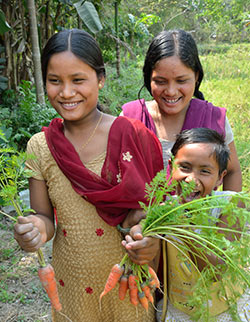 In a village in the rural Cooch Behar district of West Bengal, India – amidst rice paddies, banana trees and other lush green surroundings – a young girl is showing off a radish bigger than her arm that she has grown. She is surrounded by her proud family and neighbors. Another village girl has started a vegetable garden and is growing and selling produce at the local market. She brings home more than half the income her father makes in a day. In another area, a small group of girls has collectively created a plot and are cultivating, selling and dividing income among themselves, all the while creating a new social space to come together.
In a village in the rural Cooch Behar district of West Bengal, India – amidst rice paddies, banana trees and other lush green surroundings – a young girl is showing off a radish bigger than her arm that she has grown. She is surrounded by her proud family and neighbors. Another village girl has started a vegetable garden and is growing and selling produce at the local market. She brings home more than half the income her father makes in a day. In another area, a small group of girls has collectively created a plot and are cultivating, selling and dividing income among themselves, all the while creating a new social space to come together.
They learned these skills thanks to the Security for Girls Through Land Project (also known as the Girl’s Project) sponsored by Seattle-based Landesa, a Global Washington member organization that works to help secure land rights to the world’s poorest people. In this case, it is working to help adolescent girls realize their land rights as they become women.
“Land rights for girls is a trigger point for many issues; we know that with land, women can accrue all types of benefits for themselves, their families, and their communities,” said Melany Grout, an attorney and land tenure specialist for Landesa. “In the immediate term, helping to position girls to realize their land rights has the effect of reducing certain vulnerabilities, including child marriage, adolescent pregnancy, lack of education and malnutrition.”
Launched in 2010, the Girl’s Project is being implemented in partnership with West Bengal’s Department of Women and Child Development (WDC). Together, they are piloting a government-sponsored program called SABLA, which aims to empower adolescent girls through skill development and improvements in health and nutrition. Landesa has successfully encouraged an addition to the curriculum that focuses on land rights, asset creation and land-based livelihoods for adolescent girls.
“It’s one of the most impoverished areas in the state,” said Grout, of the choice to center the pilot program in Cooch Behar. “These are people who don’t generally have enough to eat each day, and the girls are in a tough position because for their families it is often a choice between school and food, and they are not seen as worth investing in in the long term.”
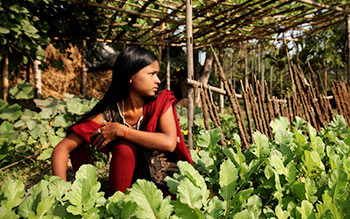 The Girl’s Project has impacted more than 40,000 girls in over 1,000 villages in the district. A recent Landesa report found that participating girls were more likely to stay in school and delay marriage and more likely to have an asset in their own name.
The Girl’s Project has impacted more than 40,000 girls in over 1,000 villages in the district. A recent Landesa report found that participating girls were more likely to stay in school and delay marriage and more likely to have an asset in their own name.
Of certain results of the recent findings, “girls that participated in our project were on average marrying a year and a half later, and we also saw that they were significantly more likely to stay in school at a critical transition age where girls would be more likely to drop out,” said Grout.
Reducing dowry is an important component of the project. The pressure on girls’ families to come up with a dowry drives girls in poor families into early marriage, when marrying a younger girl can mean avoiding a large sum. The Girl’s Project is finding ways to work with the traditional dowry structure to reduce the costs and delay marriage by encouraging a reduction in the cash dowry, and replacing that reduction with land owned by the girl. “Unlike traditional dowry it becomes an asset she can control and benefit from,” said Grout, “and we have seen an average reduction of 9 percent in the dowry amount.”
Girls gain an understanding about land rights through “Girls’ groups,” where discussions are designed to help them gain practical skills and understand the benefits of land-based livelihoods. Additionally, there are two other pieces to the program: helping boys to understand the vulnerabilities and potential of their female friends and family, and creating community engagement. The Girl’s Project team works with families and local groups through community meeting mechanisms in order to facilitate conversations about girls’ vulnerabilities and the rights and benefits of their connections to land. School forums are the main vehicle for sensitizing boys to the issue.
“We think all three pieces are the key, because you will not see durable or meaningful change for girls unless their environment is conducive to it,” said Grout. “We want their brothers, fathers, future husbands and community to be on board.”
Grout said Landesa has been generally surprised and encouraged by the positive response.
“The community seems open to the project and having the ‘Girls’ groups,’ and we were surprised by how many families and leaders were coming around to girls and land,” said Grout. “Our team has worked really hard with local leaders and elected representatives to educate them on the purpose of the program and the role that they can play, and it has been very encouraging to see local leaders speaking to their communities about the project, encouraging them to involve girls in our program, and hosting days where girls can sell their vegetables.”
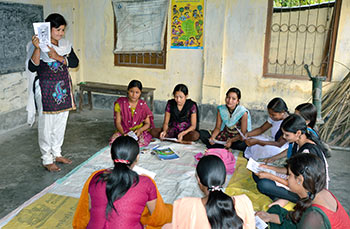 Ultimately, this is a project that the government and the girls themselves will lead. “I would say that this is the most innovative aspect of the whole project, the idea to build on resources and infrastructure that already exists,” said Grout of this partnership.
Ultimately, this is a project that the government and the girls themselves will lead. “I would say that this is the most innovative aspect of the whole project, the idea to build on resources and infrastructure that already exists,” said Grout of this partnership.
She cautions that although this project may not provide all of the answers for all of the difficulties girls face, there is irreplaceable value in the ability to change the dynamic within families and the way they value their girls. Land rights are a fundamental piece of the greater puzzle.
“It’s about connecting the girls to land in their own eyes and in the eyes of their families and communities,” said Grout. “Girls are able to leverage what they get out of the project, particularly the income that they earn, and are able to establish a different footing within their family and use that to get into school. Connecting them to land and allowing them to demonstrate their usefulness – it changes their lives.”
Watch the short documentary film about the project, “After My Garden Grows,” here.
Back to Top
Changemaker
Britt Yamamoto, Ph.D., Executive Director and Founder, iLEAP
By Gailyn Portelance
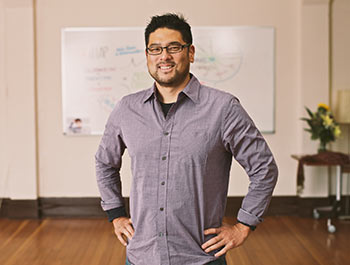 Thanks to a transformative experience in Seattle, community leaders from across Asia, Africa and Latin America are returning to their homes with a renewed sense of who they are, what they do and how best they can develop their communities. They are iLEAP graduates and they are working around the world on some of the most challenging social issues of our time, such as human trafficking, gender-based violence, access to education and sustainable agriculture.
Thanks to a transformative experience in Seattle, community leaders from across Asia, Africa and Latin America are returning to their homes with a renewed sense of who they are, what they do and how best they can develop their communities. They are iLEAP graduates and they are working around the world on some of the most challenging social issues of our time, such as human trafficking, gender-based violence, access to education and sustainable agriculture.
According to Britt Yamamoto, Ph.D., executive director and founder of iLEAP, the focus of his organization is not only on global development issues, but also on the community-based leaders who are working so hard to create change.
“I believe that social leaders are a finite resource, but we often don’t treat them that way, and we don’t tend to their long-term capacity to sustain their work,” said Yamamoto. “At iLEAP, we are about creating social change. That is, shifting social systems around the world. Our strategy is to work with those that are leading these efforts and empower them with not only knowledge and skills, but also the capacity to sustain their work on a personal and professional level.”
Yamamoto, who has worked in the social sector for over 15 years, received his bachelor’s degree in English Literature from the University of Michigan, a master’s degree in Community Development from the University of California at Davis, and later made his way to the Pacific Northwest to earn a Ph.D. in Geography from the University of Washington. He is a Fulbright Fellow who has had the opportunity to interact with a number of grassroots leaders with similar visions of creating change in the world.
Through his global travels, Yamamoto experienced a number of complicated social challenges, and wrestled with how to best approach and transform these issues. Yamamoto’s solution was iLEAP.
“iLEAP is a reflection of the belief that there is a strong relationship between transformative learning and creating social change, and that the best way to tackle any social challenge overseas is by working hand in hand with community-based leaders.”
The type of learning that forms the basis of iLEAP’s programs, one that balances personal inquiry and reflection with social action and collaboration, came from Yamamoto’s belief in the power of integrating personal experience, transformative learning and social application.
“When you invite participants to share personal stories and experiences, it creates a space and opportunity for everyone to share and weave together their narratives into a trusting community” he said. “From that foundation, we can begin to explore our own personal assumptions and socially constructed perspectives on the world and how these often get in the way of our capacity to lead with our full selves. Therefore, the challenge of learning is one of ‘un-learning’ in order to create innovative solutions to the challenges in our world.”
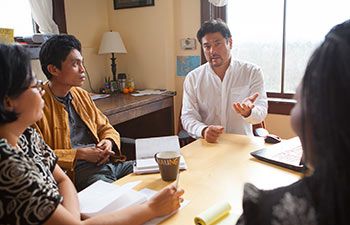 iLEAP, a Global Washington member, has nearly 300 graduates dating back to the inception of its first program launched in 2008, the International Fellowship Program. The graduates, hailing from all over the world and carrying with them the vision of Yamamoto and iLEAP, have returned to their communities and have proved to be successful leaders of social change.
iLEAP, a Global Washington member, has nearly 300 graduates dating back to the inception of its first program launched in 2008, the International Fellowship Program. The graduates, hailing from all over the world and carrying with them the vision of Yamamoto and iLEAP, have returned to their communities and have proved to be successful leaders of social change.
For inspiration for iLEAP’s programs, Yamamoto looks to instances where the development of leadership is essential for social development and transformation. For example, iLEAP created the Social Innovation Forum Japan (SIFJ) after the Tohuku earthquake and tsunami, when Yamamoto saw a critical need for stronger leadership development and cross-cultural skills amongst grassroots leaders.
“I felt that one of the most significant contributions we could make would be to work with that subset of social change leaders in Japan, and help them to better connect to outsides resources, tell their stories and develop a network within their country.”
Yamamoto is also passionate about the importance of renewing social leadership. He metaphorically speaks of fire as a representation of a leader’s ability to enact social transformation, and how leaders are often laden with so many responsibilities – so many ‘logs’ as he describes it – that their flames die down.
“Often when community leaders come to us, their flames are very low,” said Yamamoto. “Part of their renewal is taking logs off the fire, so that more of that air can flow, so that fire can be renewed. The smallest flame, if tended properly, can grow to great brilliance.”
The iLEAP community will surely touch the lives of a growing numbers of citizens in developing communities around the world. Yamamoto is looking forward to expanding and developing very clear regional strategies for Southeast Asia, East Africa, South Asia and Central America to convene and re-convene graduates from these areas.
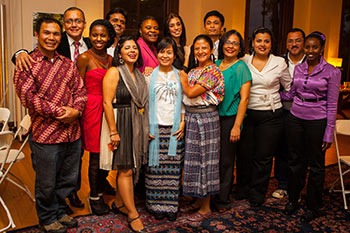 “I’m excited about our work bringing our people back together,” he says. “To bring them together to do work together, share stories, learn and connect around our iLEAP family and identity; and then to send them back to their communities with ‘relit fires.’ It is very important, and is a rare opportunity to amplify our unique work around the world.”
“I’m excited about our work bringing our people back together,” he says. “To bring them together to do work together, share stories, learn and connect around our iLEAP family and identity; and then to send them back to their communities with ‘relit fires.’ It is very important, and is a rare opportunity to amplify our unique work around the world.”
It’s safe to say Yamamoto has truly created a family of change leaders. He talks about how those who graduate from iLEAP programs speak about their experiences and the organization in the same way they would talk about their own families – that there clearly is a place in their hearts for the work that they do.
“This means a lot to me, that it’s authentic. Their human experience has been enlarged, deepened and connected as a result of their interaction with iLEAP’s work. For all that we might say and do in our efforts to change the world, isn’t that what it’s all about?”
You can learn more and get involved with iLEAP by attending one of their many public events throughout the year or becoming a homestay host for its visiting fellows. iLEAP’s next International Fellowship Program runs Oct. 20to Dec. 12.
Back to Top
Member Recognition
World Population Day 2014: Planned Parenthood of the Great Northwest Making an Impact Locally and Globally
By Michelle McMillan
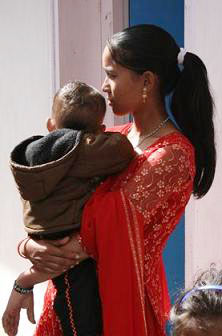 World Population Day was observed on July 11, prompting the international community to think about the effects of population on development, with an emphasis on reproductive health, gender equality and women and youth empowerment.
World Population Day was observed on July 11, prompting the international community to think about the effects of population on development, with an emphasis on reproductive health, gender equality and women and youth empowerment.
The United Nations estimates that the world’s population will reach 8.1 billion in 2025, and will further increase to 9.6 billion in 2050 and 10.9 billion by 2100. The all-time high numbers of children and young people in developing countries present a number of challenges, including the need to provide education and employment. In the least developed countries, where 40 percent of the population is under the age of 15, the problem is even more pressing1.
The UN 2014 Commission on Population and Development concluded that there needs to be emphases on promoting gender equality and empowering girls and young women. The Commission also stressed the importance of sexual and reproductive health and reproductive health rights. While access to sexual and reproductive health care is close to impossible in many parts of the world, addressing these issues and improving conditions is essential to sustainable development and stabilizing population growth.
Global Washington member Planned Parenthood of the Great Northwest (PPGNW) is already well known in the U.S. for tackling these issues and providing affordable sexual and reproductive health care to women, men and teens. However, there is more to Planned Parenthood than its domestic efforts. It also works internationally, partnering with similar organizations to provide affordable reproductive health care in places that need it most. PPGNW aims to expand global access to family planning, prevent unsafe abortions and related health consequences and empower women and youth through sexual and reproductive health education.
Among its global partners is Maternal-Infant Health Annex (MAMI) in the Dominican Republic. MAMI addresses high rates of sexually transmitted infections, HIV and adolescent pregnancy. PPGNW has assisted with teen and peer education training, sexual and reproductive health training, funding support and capacity building since 2010. According to PPGNW, within the first 22 months of the project, the number of young people attending health education sessions increased more than four-fold, and the number of family-planning adolescent clients increased by 315 percent2.
PPGNW has carried out similar programs with local organizations in Ecuador, Cameroon, Lao People’s Democratic Republic and Nepal. The non-profit organization has helped train doctors and nurses in women’s health and guided peer and teen educators in facilitating discussions about sexuality and family planning. Through these programs, PPGNW provides women, men, and teens with critical information about sexual and reproductive health, and access to family planning services.
The work of PPGNW and other similar organizations is not only important to the health of individuals; it is important to overall global development efforts. Stabilizing population growth is a key to sustainable development and will be a part of our post-2015 development agenda. While World Population Day 2014 has come and gone, great challenges remain ahead.
1http://www.unfpa.org/pds/trends.htm
2http://www.plannedparenthood.org/planned-parenthood-great-northwest/international-programs/dominican-republic/
Back to Top
Welcome New Members
Please welcome our newest Global Washington members. Take a moment to familiarize yourself with their work and consider opportunities for support and collaboration!
Global Brigades: Global Brigades is the world’s largest student-led global health and sustainable development organization. Since 2004, Global Brigades has mobilized tens of thousands of university students and professionals through skill-based programs that work in partnership with community members to improve quality of life in under-resourced regions while respecting local culture. https://www.globalbrigades.org/
Member Events
July 16, 2014: Greater Seattle Chamber of Commerce // YPN at TrueNorth Apartments
July 19, 2014: EarthCorps // Pioneer Park: Mercer Island Restoration
July 21-August 8, 2014: One World Now! // Language Camps 2014 Seattle: Arabic and Chinese
July 22, 2014: World Trade Center Seattle // Exporting Opportunities with Ghana
July 23, 2014: Seattle Trade Alliance // Quarterly Member to Member Networking and Trade Update Event
July 25, 2014: RESULTS // Introductory Call
July 26, 2014: Days for Girls International // Annual International Garden Party
July 26, 2014: The Henry M. Jackson School of International Studies, UW // Malam Budaya: A Cultural Night of Indonesian Dance
August 2, 2014: Bastyr University // Summer Open House
August 4-8, 2014: Global Visionaries // Global Leadership Summer Institute 2014
August 5, 2014: World Affairs Council // YPIN Socratic Seminar
August 9, 2014: Woodland Park Zoo // Asian Wildlife Conservation Day
August 9, 2014: NPH USA // Run for NPH
August 11, 2014: Dwankhozi Hope // Garage Sale Fundraiser
August 14, 2014: Washington Women’s Foundation // WWF Coffee and Basics
For more jobs and resources, visit https://globalwa.org/strengthen/careers-in-development/
Back to Top
Career Center
Highlighted Paid Positions
Chief Operating Officer – Landesa
Senior Project Manager – SightLife
Grants Writer – Woodland Park Zoo
Highlighted Volunteer Positions
Volunteer Copy Editor – Landesa
Volunteer – One by One
Highlighted Internship Positions
Fall 2014 World Affairs Council Internship – World Affairs Council
Graduate Level Internship, Maternal and Child Survival Project – PATH
Back to Top
GlobalWA Events
July 16:
New Member Orientation
July 17:
Executive Director Roundtable
July 24:
Networking Happy Hour with Friends of GlobalWA, Humanosphere & the World Affairs Council
December 3, 2014
Global Washington’s 6th Annual Conference
Back to Top
Contributors: Michelle McMillan, Gailyn Portelance, Sam Wolff
Oxfam to Launch Global Initiative on Inequality This Fall
By Dean Forbes
Most people know the big international anti-poverty organization Oxfam for its work on global food security and finding ways to feed the estimated 1 billion undernourished people on our planet. It brings its work on social justice, disaster relief and foreign aid reform to bear on this problem and others.
This November, Oxfam will add the broad topic of “inequality” to its global portfolio of initiatives that now includes agriculture; climate change; conflicts and disaster; health and education; and trade. Raymond C. Offenheiser, President of Oxfam America, gave a Seattle audience a brief, sneak preview of the new initiative at a reception for him and several Oxfam officials on July 7 while they were in town for Gates Foundation meetings. The reception was organized by Seattle-based Jonathan Scanlon, Senior Advocacy Advisor, Oxfam America, and cosponsored by Global Washington.
Offenheiser said much of the initiative on inequality will focus “on how do we ensure that future populations will have the same opportunities that many of us have for education, access to health, access to environmental services. There will be ample investments being made in many of these countries to enable them to have the chance to work their way out of poverty and to have the kind of social mobility that we have enjoyed in this country.”
Continue Reading
Guest: Life for Children on the Other Side of the Border
Cesario Lobos Fajardo is a student with the NPH International Leadership Institute in Seattle. His story was told with the help of Katie Hultquist, Northwest Regional Director for NPH USA, a Global Washington member.
MANY were outraged last week over the news that up to 400 unaccompanied children are crossing the U.S.-Mexico border illegally every day, most from Guatemala, Honduras and El Salvador. Many people have focused on immigration policy, border control and what to do with these kids. But I can’t stop thinking about why my young compatriots in Guatemala are making this difficult and dangerous journey in the first place.
I can remember how difficult my life was growing up in Guatemala. Alcohol abuse and domestic violence in my family made me unhappy and afraid. I had to work, even when I was only 6 years old.
Continue Reading
Dreams for Orphans: Love, Safety and Security
By Julia Knitter
How often should a seven-year old have to worry about their health or education? While these factors are often taken for granted, they can radically change the course of a child’s life. Dreams for Orphans, a new GlobalWA member, is a Seattle-based NGO that focuses on providing safe environments and educational opportunities for orphans in Accra, Ghana. Through improved education and stable living conditions, Dreams for Orphans aims to inspire hope in orphans in developing countries.
“We live in a global society, one in which education will bring positive change in so many ways,” says Dreams for Orphans co-founder Libby Rain, illustrating the importance that the organization places on childhood education.
Continue Reading
Nations Meet in UK to Take Strong Stance Against Sexual Violence in Conflict
By Hannah Atlas
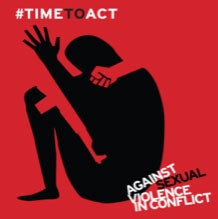 The largest international gathering ever brought together on the subject of ending sexual violence during times of conflict was held June 10-13 in London under the auspices of the United Kingdom’s Foreign & Commonwealth Office. About 1,000 participants representing more than 120 countries attended the Global Summit to End Sexual Violence in Conflict.
The largest international gathering ever brought together on the subject of ending sexual violence during times of conflict was held June 10-13 in London under the auspices of the United Kingdom’s Foreign & Commonwealth Office. About 1,000 participants representing more than 120 countries attended the Global Summit to End Sexual Violence in Conflict.
“Together, we committed to break the taboo around wartime rape and take action to put an end to its use, and to shatter the culture of impunity,” according to the summit chair summary. “At the Summit, we united in our determination to tackle sexual violence in conflict, just as previous generations joined forces to put an end to slavery and landmines. This is a matter of our common humanity.”
The summit encouraged nations to incorporate a formal international protocol for documenting and investigating sexual violence in conflict into their domestic laws. There was emphasis placed on the education and training of soldiers and peacekeepers to protect civilians during times of conflict. Improving support and protection for survivors of sexual violence and the elimination of cultural taboos were also emphasized in the summit’s call to action.
Continue Reading
Things to Consider: Fossil Fuel Divestment
By Sam Wolff
Divestment – as in, divestment from fossil fuel industries – is a relatively hot topic nowadays. It’s sometimes difficult to determine whether the prevalence of the debate is limited to liberal-leaning groups or if the conversation is a broader one. But with the recent success of the divestment movement at Stanford University, it’s evident that momentum is gaining. And, knowing the consequences of climate change, it’s apparent that this momentum needs to be universal.
Mainstream culture and media has raised awareness for the frightening future of unattended climate change – see records of rising sea levels and accounts of withering rainforests. Yet, little has changed when it comes to the practices which perpetuate environmental decline; there has been an insignificant amount of reconsideration among people when it comes to their behaviors. In light of recent studies, however, it seems that there are well-founded reasons to have a more pressing sense of urgency about this issue.

Photo Credit: CGP Grey via Flickr
“Our current models ‘grossly underestimate’ the economic damage that will be wrought by climate change,”
according to British climate change economist Lord Nicholas Stern. Stern, alongside one of his colleagues, has revised the current analysis system, the Dynamic Integrated Climate-Economy (DICE) model. His new model befits a more realistic and less simplistic view of how economies grow, which is a critique often made of the DICE model. The results of these modifications yield far more severe projections as to what the effects of climate change will be on the international economy.
Continue Reading
June 2014 Newsletter
Welcome to the June 2014 issue of the Global Washington newsletter. If you would like to contact us directly, please email us.
IN THIS ISSUE
Letter from our Executive Director
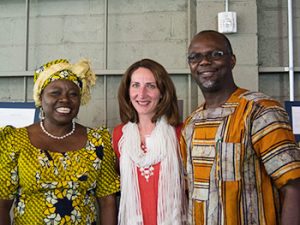 Is there really a community of international development organizations in Washington state? Or, are we all so heads down in our own work and grant requirements that it’s difficult to think about connecting with others? People are likely to fall at varying points on the spectrum, but there was a collective sense of affinity and energy for new relationship-building at Global Washington’s May 30 Spring Member Celebration.
Is there really a community of international development organizations in Washington state? Or, are we all so heads down in our own work and grant requirements that it’s difficult to think about connecting with others? People are likely to fall at varying points on the spectrum, but there was a collective sense of affinity and energy for new relationship-building at Global Washington’s May 30 Spring Member Celebration.
The festive atmosphere allowed people to share excitement about their programs and meet others doing similar work through NGOs, businesses, academic institutions and foundations. It was a great opportunity for people to meet face to face and establish a rapport that can continue into future collaborations. Some organizations even used the opportunity to present staff from outside the state, as well as outside the country, to our international development community.
Thank you to all who attended our celebration event, and to those who contributed. It was wonderful to reflect on the past success of Global Washington and to introduce our ambitious agenda going forward. I feel so honored to be part of this community, and I look forward to working with all of you in the months to come.
Sincerely,

Kristen Dailey
Executive Director
Back to Top

GlobalWA will ask you a question every month and synthesize the responses and make available to our member organizations. Please take a moment to respond to the question for this month:
What topic(s) would you like to see featured at GlobalWA’s monthly Executive Director Roundtable?
Please click here to respond.
Back to Top
Member Perspective
World Economic Forum Africa: An Interview with Mark Suzman, President, Global Policy, Advocacy and Country Programs, Bill & Melinda Gates Foundation
By Dean Forbes
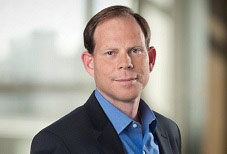 The 24th World Economic Forum on Africa, which took place May 7-9 in Nigeria’s capital, Abuja, came at a crucial time for the continent. Africa’s remarkable growth trajectory is projected to remain above 5 percent in 2014 with West Africa the fastest growing sub-region, representing the continent’s largest business opportunity. “Such momentum is a welcome and necessary boon to a region whose youthful population offers the prospects of a significant demographic dividend fuelled by growth in consumer industries, manufacturing and business process outsourcing,” according to the WEF.
The 24th World Economic Forum on Africa, which took place May 7-9 in Nigeria’s capital, Abuja, came at a crucial time for the continent. Africa’s remarkable growth trajectory is projected to remain above 5 percent in 2014 with West Africa the fastest growing sub-region, representing the continent’s largest business opportunity. “Such momentum is a welcome and necessary boon to a region whose youthful population offers the prospects of a significant demographic dividend fuelled by growth in consumer industries, manufacturing and business process outsourcing,” according to the WEF.
Taking place under the theme, Forging Inclusive Growth, Creating Jobs, the forum, a regional replica of the signature Davos, Switzerland event, brought together over 1,000 leaders from across politics, business and civil society to discuss innovative structural reforms and investments that can sustain the continent’s growth while creating jobs and prosperity for all its citizens.
Among those who attended the forum was Mark Suzman, President, Global Policy, Advocacy, and Country Programs for the Bill & Melinda Gates Foundation. Based in Seattle, the foundation is a member of Global Washington. Upon Suzman’s return, he kindly agreed to answer questions about the forum and Africa’s potential. What follows are his unedited written responses.
GlobalWA: A story in the Nigerian paper BusinessDay published a week before the forum characterized Africa as the world’s last economic frontier continent. Do you agree? How would you characterize the continent’s potential?
Mark Suzman: There’s no question the economic potential of Africa is huge. It is the second most populous continent, with more than a billion people, significant natural resources, a growing middle class, and a clear sense of momentum. More than half the world’s 10 fastest-growing economies are in Africa, and over the last decade, the economic growth rate in sub-Saharan Africa has surpassed that of most wealthy countries.
As someone born and raised in South Africa, it’s exciting to see the economic and social transformation that’s occurring across much of the continent. To be clear, the benefits of progress have not yet reached everyone in Africa, but for many, life has never been better. Income per person is up by nearly two-thirds since 1998. So there’s clearly reason to be optimistic about Africa’s future.
GlobalWA: The conference theme was “Forging Inclusive Growth, Creating Jobs,” and organizers acknowledged the challenges of needed structural reforms while delivering benefits to all of its citizens. From your perspective, what are the key issues that must be addressed in order for the continent’s economy to grow while channeling the benefits of that growth to its people?
Suzman: The change has to start with each country prioritizing and making the kinds of investments domestically that are necessary to lay the groundwork for economic growth. There are many areas for policy change and investment that can have a great impact. Education, for example, and certain types of infrastructure investments such as roads that enable small farmers to move crops to market, energy-generation projects, and essential municipal facilities and services.
Our primary areas of focus at the foundation are agricultural development and health. We know from experience that countries that are investing in these areas are seeing those investments pay off in the form of poverty reduction, reduced child mortality and better health, and stronger economies. And, significantly, public-sector investments in areas with a proven track record of contributing to economic growth also attract other sources of investment – from donor governments, the private sector, and newer development actors such as our foundation and others.
GlobalWA: Are there certain job-creation strategies that are likely to be more effective than others in Africa?
Suzman: Breaking the cycle of early death, disease, and poverty is fundamental to the development of stronger economies and jobs creation. Health and agricultural development are two of the key levers that can do that.
Farmers make up two-thirds of the workforce in Africa, so helping smallholder farmers increase the productivity of their crops enables farming families to eat more nutritionally-diverse diets, send their children to school, and live better lives. And when farmers’ income increases, it stimulates growth in other sectors of the economy.
African countries that have invested significantly in agriculture (around 10 percent of their budget) are realizing impressive returns. In fact, all but one of the African countries making this level of investment is on track to halve extreme poverty by 2015.
Similarly, African countries that are significantly stepping up their investments in health are seeing the payoff. Ethiopia is a case in point. Their ambitious agricultural agenda has mobilized key donors – including USAID, the World Bank, and our foundation. In 2012, more than 500,000 farmers received training in new agricultural practices that are expected to significantly increase yields and reduce post-harvest losses. Efforts are also underway to link smallholder farmers with new markets and strengthen farmer cooperatives.
With donor support, Ethiopia has also significantly increased spending on health. As recently as 1990, one in five Ethiopian children died before the age of five – many in the first month of life. The child mortality rate has since dropped to one in five. A key factor in this advance is Ethiopia’s mobilization of more than 34,000 health workers who now reach the vast majority of Ethiopia’s population of more than 90 million. The health services are basic, but they have significantly improved people’s lives. Health workers deliver babies and administer vaccines. Health posts are stocked with malaria drugs and supplements that provide essential micronutrients like folic acid and Vitamin A. Use of modern contraceptives has risen four fold, giving women the opportunity to plan their families. Children are healthier, doing better in school and missing fewer days of class.
These kinds of investments – in health and agriculture – have helped underpin the growth of Ethiopia’s economy. Between 2000 and 2012, the country’s gross domestic product quadrupled to $40 billion, and the gross national income per capita more than doubled – from $467 to $1,110.
GlobalWA: Are there lessons for African officials to be learned from the economic growth models, including increased urbanization, of China and India?
Suzman: Countries like China and India—and Brazil and Mexico—are in a great position to work closely with African countries because they have recent experience in reducing poverty. They also have large cadres of well-educated scientists and engineers able to innovate in relevant ways. This unique combination gives them both the insights and the skills to create breakthrough tools for development. It’s exciting to see the potential of these kinds of partnerships. Ethiopia, for instance, is talking with China about its agricultural extension model, and Nigeria is talking with Brazil about its agricultural development and nutrition model that has been so successful in recent years.
About the WEF
The World Economic Forum is an international institution committed to improving the state of the world through public-private cooperation in the spirit of global citizenship. It engages with business, political, academic and other leaders of society to shape global, regional and industry agendas. Incorporated as a not-for-profit foundation in 1971 and headquartered in Geneva, Switzerland, the Forum is independent, impartial and not tied to any interests. It cooperates closely with all leading international organizations (www.weforum.org).
Back to Top
Featured Organization
Oxfam America
By Holly Koch
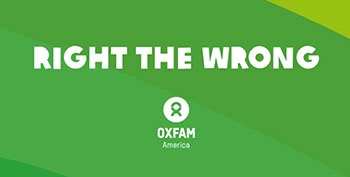 From the Southeast Asian tsunami in 2004, Hurricane Katrina in 2005, the Haitian earthquake in 2010 and, most recently, last year’s Philippine typhoon, news headlines have often been dominated by stories of the devastating effects of natural disasters. In response, the American public has taken to their checkbooks.
From the Southeast Asian tsunami in 2004, Hurricane Katrina in 2005, the Haitian earthquake in 2010 and, most recently, last year’s Philippine typhoon, news headlines have often been dominated by stories of the devastating effects of natural disasters. In response, the American public has taken to their checkbooks.
Since 2000, GlobalWA member organization Oxfam America, one of the Oxfam confederation’s seventeen affiliated organizations, has seen an approximate 250% increase in revenue, due in large part to charitable giving for disaster relief.
“We’ve been very lucky and grateful that many of the donors that came to us initially with a one-time donation for a natural disaster have stayed with us as donors for the long run,” said Oxfam Senior Advocacy Advisor, Jonathan Scanlon. This “long run” support is essential to combatting the effects of climate change, for which Oxfam asserts is the cause of the increased frequency and severity of storms.
Highly ranked by Charity Navigator, Oxfam’s mission is to right the wrongs of hunger, poverty and injustice. “We work mainly in three areas,” said Scanlon, “the first being in humanitarian response, the second part is longer-term poverty reduction work, and the third area of our work is campaigning.”
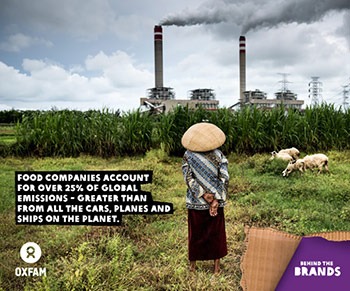 Climate change has become a top priority for Oxfam. “On the programmatic side, we do a lot of work with farmers and a lot of work with people in low-lying areas,” said Scanlon. This includes investing significant resources into disaster risk reduction, as well as helping farmers adapt to rainfall changes, which have a large effect on how, what, and when farmers plant their crops.
Climate change has become a top priority for Oxfam. “On the programmatic side, we do a lot of work with farmers and a lot of work with people in low-lying areas,” said Scanlon. This includes investing significant resources into disaster risk reduction, as well as helping farmers adapt to rainfall changes, which have a large effect on how, what, and when farmers plant their crops.
Scanlon continued, “On the advocacy side of things, this is something we’ve been campaigning on for probably the last eight to ten years or so,” which has included pushing for funding and the examination of government and company policies as they relate to the mitigation of, and adaptation to, climate change.
One of Oxfam’s climate-related projects is a crop insurance program in Ethiopia. “In the U.S. and in many other countries, farmers have this backup option in years of low rainfall; they have some insurance that they pay into,” explained Scanlon.
What began as a small-scale venture in Ethiopia with the government, state organizations and the global insurance company, Swiss Re, has expanded to a few other countries and has even become part of the work of the World Food Program.
“It’s been a successful initiative, providing more security for farmers in Ethiopia, and we think this is something that will be increasingly important as climates and rainfall patterns continue to change in countries around the world.”
Larger scale efforts of Oxfam to tackle climate change have included its more recent Behind the Brands campaign, in which it examines the practices and policies of the food and beverage industry’s “Big Ten.”
The campaign attempts to single out General Mills and Kellogg’s, two companies with the worst scores among its rubric of seven themes (transparency, women, workers, farmers, land, water and climate) in an attempt to use their size and influence to become industry leaders in efforts to reduce greenhouse gas emissions and deforestation.
“In general, we’re saying it’s governments, it’s companies and investors, that really have the responsibilities here because they’re the most powerful actors,” explained Scanlon. Consumers have a part to play, as well, he said.
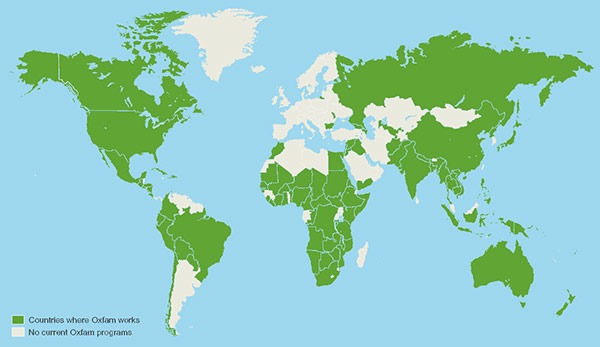 “We have the responsibility to make changes in our own behaviors and our own policies,” Scanlon continued. “We believe that if we make changes in the right direction, we can still have an impact on those that are living in poverty and are seeing the direct consequences of climate change.”
“We have the responsibility to make changes in our own behaviors and our own policies,” Scanlon continued. “We believe that if we make changes in the right direction, we can still have an impact on those that are living in poverty and are seeing the direct consequences of climate change.”
Like many of GlobalWA’s members, much of the work that Oxfam America does largely takes place out of sight of the developed world. But, climate change will have very personal repercussions over the coming centuries, as made painfully evident by the recently released study on the impending collapse of the Antarctic Ice Sheet.
“This is going to have an impact on those of us living right here in the Puget Sound,” said Scanlon. ”When you look at the impact of a ten foot rise in sea level, it’s scary as far as what would be underwater and what would be left.”
It is information like this that Scanlon and his Oxfam America team hope will inspire people to proactively fight for the future of themselves and others. “It’s the kind of thing that we can take action on here in this area,” said Scanlon. “And, we can have an impact – not only locally, but we can have an impact globally.”
Back to Top
Changemaker
Dennis Macray, Vice President for Sustainable Operations and Social Impact, Theo Chocolate
By Holly Koch
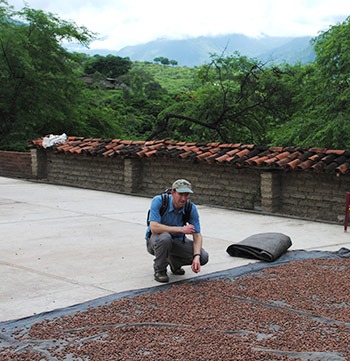 When President John F. Kennedy signed an Executive Order to kick-start the Peace Corps program in 1961, he was undoubtedly hoping it would be people like Dennis Macray that would take up the mantle for global service.
When President John F. Kennedy signed an Executive Order to kick-start the Peace Corps program in 1961, he was undoubtedly hoping it would be people like Dennis Macray that would take up the mantle for global service.
After graduating with a degree in Political Science from Harvard University, Macray completed his two years as a Peace Corps volunteer in the western highlands of Guatemala, where his passion for fair trade and sustainable environmental practices in coffee and cocoa took root.
“When you’re young and impressionable you think, ‘This is a huge issue,’ and you realize you have to do something about it,” said Macray of his reaction to harmful coffee production methods and practices he witnessed while in Guatemala.
While those years of service are often life changing for volunteers, it is safe to say that Macray’s continued pursuit of corporate social responsibility (CSR) in agricultural supply chains throughout his career is both unique and admirable.
Inspired by his experiences in Central America, Macray chose to attend UC Berkeley’s Haas School of Business because of its CSR program. “What I was looking at,” he explained, “was how do you get the private sector to be more responsible, and support a new model of social enterprise?”
While at Haas, in addition to attempting to answer that question, Macray was a founding member of Net Impact, or as it was known at the time, Students for Responsible Business, a membership organization with a mission “to make business different.”
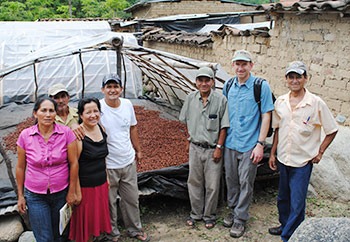 “Today I see business schools around the country competing to have the best CSR program,” explained Macray. “That didn’t exist when I went to business school so, at the time, it was a pretty radical idea we had.”
“Today I see business schools around the country competing to have the best CSR program,” explained Macray. “That didn’t exist when I went to business school so, at the time, it was a pretty radical idea we had.”
Since graduating from UC Berkeley, Macray has spent considerable time working with farmers in dozens of developing countries, and has become a go-to expert for many of the most influential organizations in his field. For the Bill & Melinda Gates Foundation, a GlobalWA member, Macray consults on its East African Coffee Initiative, as well as its Cocoa Livelihoods Program in West Africa.
For the World Cocoa Foundation (WCF), his consulting is largely based on setting metrics. According to Macray, “The WCF is unique in that it was established to address the needs of everyone along the value chain in the cocoa industry,” making his contributions vital to the WCF’s efforts to track progress in sustainable cocoa production.
Integral to his knowledge base were the eight years he spent at Starbucks as the company’s Director of Global Responsibility. While there, he utilized his experiences at Conservation International, helping fledgling enterprises choose sustainable income over destructive environmental practices as a means of survival, to strengthen the company’s sourcing policies for coffee, cocoa and manufactured goods.
“In developing C.A.F.E. Practices [Starbucks ethical sourcing program for coffee], I wanted to make sure we had very rigorous requirements for preserving the environment in coffee production and keeping that as a core principle for all of the coffee that Starbucks purchased,” explained Macray.
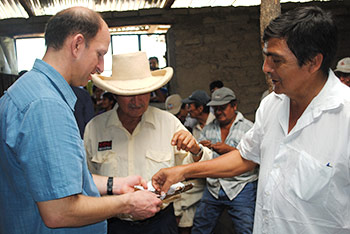 Recently, Macray made a big move to a much smaller company, Theo Chocolate, another GlobalWA member, where he is Vice President for Sustainable Operations and Social Impact. Of his role, Macray explained, “I have the responsibility for looking across all aspects of the company to ensure that it is committed to its mission and to sustainability.”
Recently, Macray made a big move to a much smaller company, Theo Chocolate, another GlobalWA member, where he is Vice President for Sustainable Operations and Social Impact. Of his role, Macray explained, “I have the responsibility for looking across all aspects of the company to ensure that it is committed to its mission and to sustainability.”
To partake in Macray’s tour of the Theo factory, and to listen to his explanation of its processes, is to understand that his dedication to Theo Chocolate and to the principles on which it holds itself up is unimpeachable. So, when Macray says, “We have a very strong focus on making lives better where we do business,” he means it.
Of his passion for sustainability and fairness along the value chain, Macray said,
“My dream is that more people will start to ask questions about where a product came from and how it was produced.”
He continued, “Rather than having a race to the bottom in global trade, we should all be racing to the top, and consumers can make that difference.”
Back to Top
See pictures from our Spring Member Celebration!
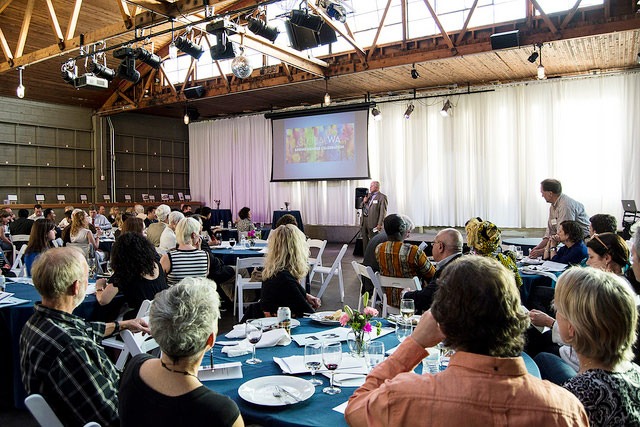
See our flickr photo set here: https://www.flickr.com/photos/globalwa/sets/72157644981662185/
Back to Top
Welcome New Members
Please welcome our newest Global Washington members. Take a moment to familiarize yourself with their work and consider opportunities for support and collaboration!
Atlas Members:
Bastyr University: A regionally accredited, globally respected institution of natural health arts and sciences, Bastyr University is improving the planet through innovative education, research and clinical service. www.bastyr.edu
Office of Global Affairs, UW: The Office of Global Affairs at UW is a central organizational hub, connecting diverse internal and external networks of scholars, students and community leaders engaging in international issues and scholarship. http://www.washington.edu/globalaffairs/
Cascades Members:
Dreams for Orphans: Dreams for Orphans is a Seattle-based 501(c)3 and NGO working in Ghana to provide safe environments and educational opportunities for those who need them most. They support infants and children who have been abandoned or abused. Over the last five years, they’ve helped hundreds of orphans live a better life by helping to change their living and learning conditions. http://dreamsfororphans.org/
Women’s Empowerment Cancer Advocacy Network: The Women’s Empowerment Cancer Advocacy Network (WE CAN) conducts breast and cervical cancer advocacy, education and outreach conferences in low and middle resource countries. The goal is to connect, train and support leaders of women’s cancer NGOs, health care providers and policymakers who support patient empowerment. http://globalhealth.washington.edu/node/7726
Member Events
June 17, 2014: Pangea // Looking For A Way to Connect Locally to Engage Globally?
June 23, 2014: WCTA // Clean Technology Showcase
June 24, 2014: Seattle University // Coffee Conversation & Seattle University Campus Tour
June 27, 2014: Third Sector Company // Succession Planning for Nonprofit Organizations
June 28, 2014: World Bicycle Relief // Red-Bell 100
July 14-18, 2014: The University of Washington School of Law // Global Health Law Summer Institute
August 4-8, 2014: Global Visionaries // Global Leadership Summer Institute 2014
Ongoing: GlobalWA network registration discount // 2014 Independent Sector National Conference
Back to Top
Career Center
Highlighted Paid Positions
Regional Director – Global Impact
Director of Development, Advocacy, and Communications – Committee for Children
Capital Resource Operations Officer – Global Partnerships
Senior Consultant – FSG
Highlighted Volunteer Positions
Volunteer – Planned Parenthood of the Great Northwest
Highlighted Internship Positions
Grant Writer Internship – Global Visionaries
Intern – One Equal Heart Foundation
For more jobs and resources, visit https://globalwa.org/strengthen/careers-in-development/
Back to Top
GlobalWA Events
June 19:
Networking Happy Hour with Friends of GlobalWA & Humanosphere
July 16:
New Member Orientation
July 17:
Executive Director Roundtable
Back to Top
Contributors: Dean Forbes, Holly Koch
Preparing For Your Next Trip Abroad? Don’t Forget a Contingency Plan
By Gailyn Portelance
On June 12, Global Washington, in partnership with Emirates Airlines and Port of Seattle, hosted a panel discussion with representatives from four of its travel-savvy member organizations to talk strategy on how to effectively plan for a staff or donor trip abroad.
The conversation, moderated by Bruce Beckman, Senior Sales Executive of GlobalWA member Emirates, covered topics ranging from safety and security of travelers to helping donors and staff members get the most out of their time abroad.
All three panelists emphasized the importance of extensive planning and preparation.
Scott Garrepy, Chief Development Officer of GlobalWA member SightLife, who has led multiple donor trips to India, said the initial challenge while leading group donor travel is identifying the goals of the trip. Once they have been established, he suggested working backwards to create a plan to achieve them. Important preparatory concerns include: making time for both achieving mission and having a little fun, preparing donors for a different culture than they might be used to, and setting norms for acceptable donor behavior. “Sometimes people do crazy things,” said Garrepy. In the end, it is most essential to plan early, and plan for everything. “No plan ever survives,” he said, emphasizing the importance of a contingency plan that covers every scenario.
Continue Reading
Calling all teachers, educators, agents of change—two fantastic opportunities are coming to Seattle this August!
By Ian Greer
Building upon the success of last year’s one-day educational workshop, Global Visionaries has partnered with Seattle University’s School of Education, Washington’s Superintendent of Public Instruction (OSPI), Seattle Public Schools, Global Weeks, and the World Affairs Council to develop the 2014 Global Leadership Summer Institute for Educators.

There are two opportunities available this year:
- The five-day Institute from August 4-8.
- The one-day workshop on Friday, August 29.
Both programs are designed to provide teachers with the tools to create a democratic classroom, a climate of mutual respect, and shared ownership among the students. Participants will leave with lesson plans, sample course policies, and access to a wealth of ready-to-use curricula.
Continue Reading
 Phuket in February and Seattle in August. Many Washingtonians working in global development plan their international travel for the fall and winter so that they can be home to enjoy our state’s glorious summer. And, why not? For many, July is a month where work slows down, happy hours become more frequent, and there are weekly opportunities to get out and meet with peers. All of this means that summer is a busy time for Global Washington.
Phuket in February and Seattle in August. Many Washingtonians working in global development plan their international travel for the fall and winter so that they can be home to enjoy our state’s glorious summer. And, why not? For many, July is a month where work slows down, happy hours become more frequent, and there are weekly opportunities to get out and meet with peers. All of this means that summer is a busy time for Global Washington.


 Certainly, the MDG declaration, as with nearly all legislation, was not perfect. Critiques by scholars and the popular media criticized the lack of analysis behind the MDGs’ tenets. One example cited of this under-analysis is the problematic and exasperating nature of World Bank loans to developing economies. Another is the under-emphasis on agricultural development within the MDGs, despite the fact that vast numbers of the impoverished world subsist through agriculture.
Certainly, the MDG declaration, as with nearly all legislation, was not perfect. Critiques by scholars and the popular media criticized the lack of analysis behind the MDGs’ tenets. One example cited of this under-analysis is the problematic and exasperating nature of World Bank loans to developing economies. Another is the under-emphasis on agricultural development within the MDGs, despite the fact that vast numbers of the impoverished world subsist through agriculture. In a village in the rural Cooch Behar district of West Bengal, India – amidst rice paddies, banana trees and other lush green surroundings – a young girl is showing off a radish bigger than her arm that she has grown. She is surrounded by her proud family and neighbors. Another village girl has started a vegetable garden and is growing and selling produce at the local market. She brings home more than half the income her father makes in a day. In another area, a small group of girls has collectively created a plot and are cultivating, selling and dividing income among themselves, all the while creating a new social space to come together.
In a village in the rural Cooch Behar district of West Bengal, India – amidst rice paddies, banana trees and other lush green surroundings – a young girl is showing off a radish bigger than her arm that she has grown. She is surrounded by her proud family and neighbors. Another village girl has started a vegetable garden and is growing and selling produce at the local market. She brings home more than half the income her father makes in a day. In another area, a small group of girls has collectively created a plot and are cultivating, selling and dividing income among themselves, all the while creating a new social space to come together. The Girl’s Project has impacted more than 40,000 girls in over 1,000 villages in the district. A recent Landesa
The Girl’s Project has impacted more than 40,000 girls in over 1,000 villages in the district. A recent Landesa  Ultimately, this is a project that the government and the girls themselves will lead. “I would say that this is the most innovative aspect of the whole project, the idea to build on resources and infrastructure that already exists,” said Grout of this partnership.
Ultimately, this is a project that the government and the girls themselves will lead. “I would say that this is the most innovative aspect of the whole project, the idea to build on resources and infrastructure that already exists,” said Grout of this partnership. Thanks to a transformative experience in Seattle, community leaders from across Asia, Africa and Latin America are returning to their homes with a renewed sense of who they are, what they do and how best they can develop their communities. They are
Thanks to a transformative experience in Seattle, community leaders from across Asia, Africa and Latin America are returning to their homes with a renewed sense of who they are, what they do and how best they can develop their communities. They are  iLEAP, a Global Washington member, has nearly 300
iLEAP, a Global Washington member, has nearly 300  “I’m excited about our work bringing our people back together,” he says. “To bring them together to do work together, share stories, learn and connect around our iLEAP family and identity; and then to send them back to their communities with ‘relit fires.’ It is very important, and is a rare opportunity to amplify our unique work around the world.”
“I’m excited about our work bringing our people back together,” he says. “To bring them together to do work together, share stories, learn and connect around our iLEAP family and identity; and then to send them back to their communities with ‘relit fires.’ It is very important, and is a rare opportunity to amplify our unique work around the world.” World Population Day was observed on July 11, prompting the international community to think about the effects of population on development, with an emphasis on reproductive health, gender equality and women and youth empowerment.
World Population Day was observed on July 11, prompting the international community to think about the effects of population on development, with an emphasis on reproductive health, gender equality and women and youth empowerment. The largest international gathering ever brought together on the subject of ending sexual violence during times of conflict was held June 10-13 in London under the auspices of the United Kingdom’s Foreign & Commonwealth Office. About 1,000 participants representing more than 120 countries attended the
The largest international gathering ever brought together on the subject of ending sexual violence during times of conflict was held June 10-13 in London under the auspices of the United Kingdom’s Foreign & Commonwealth Office. About 1,000 participants representing more than 120 countries attended the 
 Is there really a community of international development organizations in Washington state? Or, are we all so heads down in our own work and grant requirements that it’s difficult to think about connecting with others? People are likely to fall at varying points on the spectrum, but there was a collective sense of affinity and energy for new relationship-building at Global Washington’s May 30 Spring Member Celebration.
Is there really a community of international development organizations in Washington state? Or, are we all so heads down in our own work and grant requirements that it’s difficult to think about connecting with others? People are likely to fall at varying points on the spectrum, but there was a collective sense of affinity and energy for new relationship-building at Global Washington’s May 30 Spring Member Celebration. The 24th World Economic Forum on Africa, which took place May 7-9 in Nigeria’s capital, Abuja, came at a crucial time for the continent. Africa’s remarkable growth trajectory is projected to remain above 5 percent in 2014 with West Africa the fastest growing sub-region, representing the continent’s largest business opportunity. “Such momentum is a welcome and necessary boon to a region whose youthful population offers the prospects of a significant demographic dividend fuelled by growth in consumer industries, manufacturing and business process outsourcing,” according to the WEF.
The 24th World Economic Forum on Africa, which took place May 7-9 in Nigeria’s capital, Abuja, came at a crucial time for the continent. Africa’s remarkable growth trajectory is projected to remain above 5 percent in 2014 with West Africa the fastest growing sub-region, representing the continent’s largest business opportunity. “Such momentum is a welcome and necessary boon to a region whose youthful population offers the prospects of a significant demographic dividend fuelled by growth in consumer industries, manufacturing and business process outsourcing,” according to the WEF. From the Southeast Asian tsunami in 2004, Hurricane Katrina in 2005, the Haitian earthquake in 2010 and, most recently, last year’s Philippine typhoon, news headlines have often been dominated by stories of the devastating effects of natural disasters. In response, the American public has taken to their checkbooks.
From the Southeast Asian tsunami in 2004, Hurricane Katrina in 2005, the Haitian earthquake in 2010 and, most recently, last year’s Philippine typhoon, news headlines have often been dominated by stories of the devastating effects of natural disasters. In response, the American public has taken to their checkbooks. Climate change has become a top priority for Oxfam. “On the programmatic side, we do a lot of work with farmers and a lot of work with people in low-lying areas,” said Scanlon. This includes investing significant resources into disaster risk reduction, as well as helping farmers adapt to rainfall changes, which have a large effect on how, what, and when farmers plant their crops.
Climate change has become a top priority for Oxfam. “On the programmatic side, we do a lot of work with farmers and a lot of work with people in low-lying areas,” said Scanlon. This includes investing significant resources into disaster risk reduction, as well as helping farmers adapt to rainfall changes, which have a large effect on how, what, and when farmers plant their crops. “We have the responsibility to make changes in our own behaviors and our own policies,” Scanlon continued. “We believe that if we make changes in the right direction, we can still have an impact on those that are living in poverty and are seeing the direct consequences of climate change.”
“We have the responsibility to make changes in our own behaviors and our own policies,” Scanlon continued. “We believe that if we make changes in the right direction, we can still have an impact on those that are living in poverty and are seeing the direct consequences of climate change.” When President John F. Kennedy signed an Executive Order to kick-start the Peace Corps program in 1961, he was undoubtedly hoping it would be people like Dennis Macray that would take up the mantle for global service.
When President John F. Kennedy signed an Executive Order to kick-start the Peace Corps program in 1961, he was undoubtedly hoping it would be people like Dennis Macray that would take up the mantle for global service. “Today I see business schools around the country competing to have the best CSR program,” explained Macray. “That didn’t exist when I went to business school so, at the time, it was a pretty radical idea we had.”
“Today I see business schools around the country competing to have the best CSR program,” explained Macray. “That didn’t exist when I went to business school so, at the time, it was a pretty radical idea we had.” Recently, Macray made a big move to a much smaller company,
Recently, Macray made a big move to a much smaller company, 
